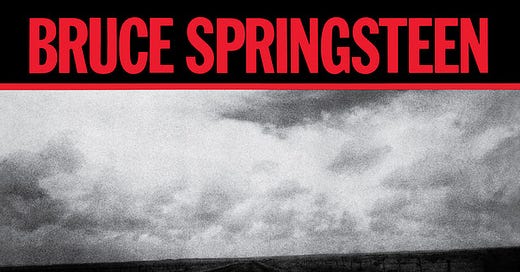EVERY GENRE PROJECT - December 5 - Americana
Genre of the Day - Americana
Album of the Day - Nebraska by Bruce Springsteen (1982)
The modern pop canon’s queen of Americana Lana Del Rey ends her song “Arcadia,” a tender geographical treatise on hope and love with a simple, plaintive word: America. To distill a nation as geographically, culturally, and politically heterogeneous as the US is a difficult musical task, but Del Rey and other auteurs have found ways to do it with understated elegance. At the genre level, americana is an attempt at drawing little commonalities and resonant vignettes out of the vastness of 3,809,525 square miles. The US imprints its coins with the Latin phrase E pluribus unum—out of many, one. It also works as a motto for songwriting in americana, how it expresses individual experiences of what it means to be American.
The word americana was surprisingly only added to Merriam-Webster in 2011 after the Grammy Awards instituted a category for the genre in 2010, indicating the phenomenon’s recency, but the genre draws from centuries of distinctly American, multiracial, working-class musical roots—folk, gospel, country, blues, bluegrass. It often zeroes in on traditions and symbolism that musicians first began to use to define American ruggedness in the mythologies of western music.
If reactionism forms one definitional basis of being American, given the country’s roots in federal revolution, americana music follows that tradition. The country music ecosystem tends to be a push-and-pull between what is perceived as overdone studio excess—Nashville sound or bro-country being examples—and more raw expressions. Americana falls in the latter, originating from artists objecting to commercialized country in the late ‘80s and into ‘90s. Both americana artists and fans yearn for authenticity, favoring spare acoustic arrangements that recall guitar traditions like Piedmont blues. The US pioneered the practices of the music business, so it’s no surprise that there’s been a feedback loop of organizations aiming to promote americana and organize festivals that draw audiences in close, like the Americana Music Triangle between New Orleans, Nashville, Memphis the Americana Music Association in Nashville founded in 1999—which actually has a sister organization in the UK.
Bruce Springsteen is one of the quintessential artists of American music—just typing his name, the chorus to Born in the USA thundered into my mind. Though not ready-made for blasting on the Fourth of July, his confrontational and intimate 1982 album Nebraska is a more meditative approach to his place in the Americana canon. The titular opener’s arrangement is like a Tom Bartek painting, bare-bones yet evocative as he catches you off-guard with a macabre plot twist inspired by a real-life figure. The vigorous strum of “Atlantic City” gestures at the gorgeous range of American roots instrumentation with its subtle mandolin flourishes as he pays homage to his home state of New Jersey’s most reviled yet fascinating casino city. The spirit of rockabilly manifests in the guitar cadence of “Johnny 99.” The raw, wild screams of “State Trooper” display his ability to electrify a tune even when not surrounded by his typical band. Nebraska functions like a confessional in a sonic church—contemplating journeys through family, highways, and forests gives him the chance to let down his guard and draw out gripping narratives of American archetypes.





